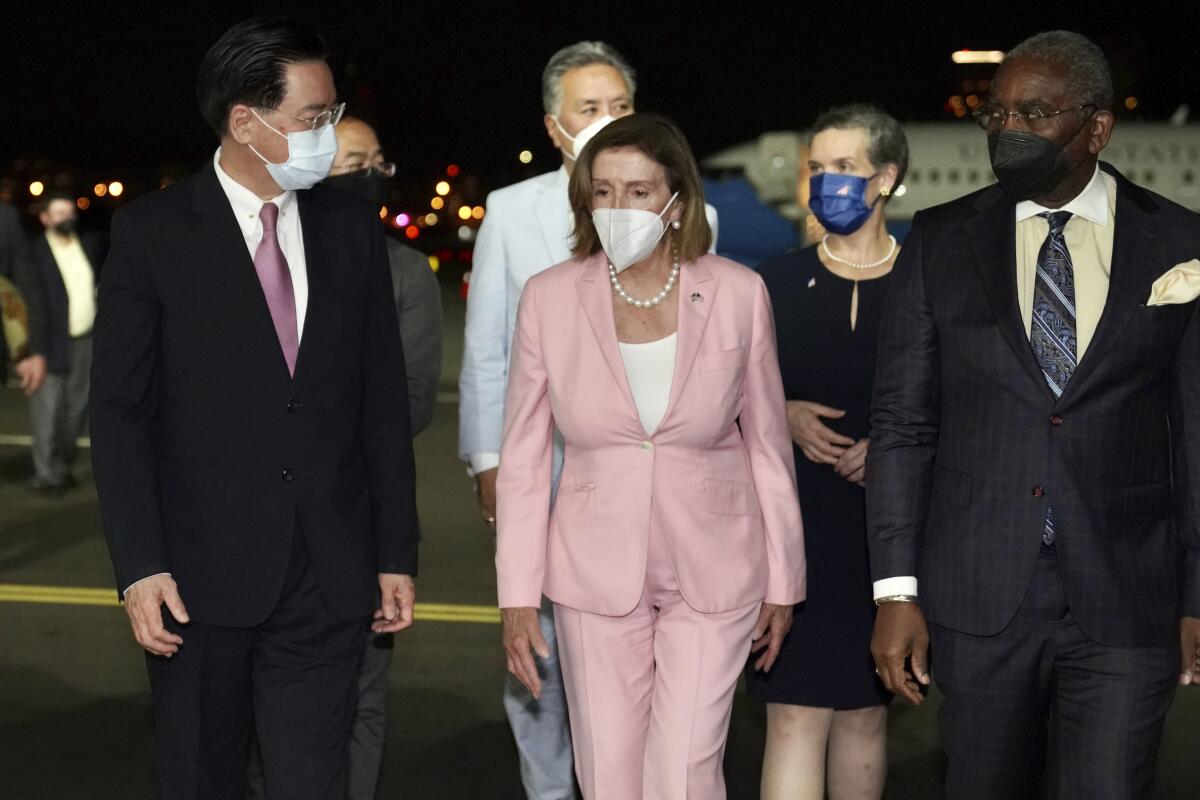Why did Pelosi pick this moment to travel to Taiwan?

- Share via
WASHINGTON — Some 30 years after the young, little-known lawmaker Nancy Pelosi unfurled a small flag of protest in Tiananmen Square, the now-House speaker waged a much more prominent show of defiance against the Chinese Communist Party by leading a congressional delegation to Taiwan on Tuesday.
The visit marked the first time a U.S. House speaker has visited Taiwan in more than 25 years. Rumors of the scheduled trip had prompted warnings of retaliation by the Chinese government and a public call from President Biden to cancel her plans.
But for Pelosi (D-San Francisco), there are several reasons the provocative trip should come as little surprise.
It tracks neatly with her long record as a harsh critic of Beijing’s human rights abuses. And anti-China sentiments in Congress right now are so high, even Republicans are supporting her visit.
It’s also a legacy-building trip that may serve as a capstone to her international diplomatic efforts, as she is expected to step down as House Democratic leader next year. Pelosi, now 82, said in 2018 that she would not run for speaker after 2022, although she has more recently been mum about whether this is her last year on Capitol Hill.
China’s threat to retaliate if Pelosi went ahead with her plan to visit the self-regulated Taiwan — which Beijing claims sovereignty over — may have only strengthened her resolve.
“Once the threat was made, I think it made it even more important in her mind to be there in this moment,” said Samuel Chu, founder of the Campaign for Hong Kong.
At the same time, Pelosi’s own record as a high-profile critic of the Chinese government may have had a similar effect on China, leading it to push back more strongly than it would have if a less vocal politician were planning the visit.
“You have to see it in the context that the Chinese government has not been a fan of hers, and that’s saying it politely,” said Carolyn Bartholomew, a longtime former Pelosi staffer who is now a member of the U.S.-China Economic and Security Review Commission. “They have resented her leadership on a number of issues on U.S.-China relations: human rights, nonproliferation and trade.”
Pelosi’s visit comes as tensions have dramatically increased between Beijing and Taiwan. Now this “island of resilience,” as Pelosi called it in a Washington Post opinion piece, “is under threat.”
Standing up to China’s human rights abuses was an early clarion call in Pelosi’s congressional career, prompting many standoffs with U.S. presidents — Democrats and Republicans — over China. She used the tools of the U.S. government to try to improve conditions there, such as leveraging trade authority and opposing China’s requests to host the Olympics.
“This trip is part of what she has been doing all along,” Bartholomew said. “In the early 1990s it was a focus on human rights, and it expanded to nonproliferation and trade. But she’s been consistent on these issues for the last 33 years.”
In 1989, as Pelosi watched the protests in Tiananmen Square and was eager to do something, she drafted a bill to waive student visa requirements for Chinese students in the United States. Fearful they could face persecution back home, she quickly curried support for the bill, author Molly Ball wrote in the biography “Pelosi.”
It passed the House and Senate on Pelosi’s lobbying, but was vetoed by then-President George H.W. Bush. The House overrode the veto. Bush convinced the Senate not to do so, but agreed to an executive order that accomplished the same thing — a win for the future speaker.
Two years later, Pelosi and two other members of Congress staged a show of support in Tiananmen Square for those who died in the demonstrations.
The three lawmakers slipped away from their official escorts in Beijing and visited the square — with American media in tow. Armed with white roses, they unfurled a small black flag that read, “To those who died for democracy in China.” Chinese officials chased the lawmakers out of the square.
Pelosi’s trip on Tuesday drew the support of many congressional Republicans, who are eager to stand up to China and to push back on the Biden administration’s admonishments that Pelosi should not go.
“For decades, members of the United States Congress, including previous Speakers of the House, have travelled to Taiwan,” a group of 26 GOP senators, including Senate Minority Leader Mitch McConnell, said in a statement. “This travel is consistent with the United States’ One China policy to which we are committed. We are also committed now, more than ever, to all elements of the Taiwan Relations Act.”
More to Read
Get the L.A. Times Politics newsletter
Deeply reported insights into legislation, politics and policy from Sacramento, Washington and beyond. In your inbox three times per week.
You may occasionally receive promotional content from the Los Angeles Times.











